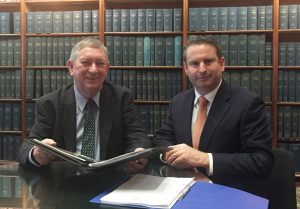
Local MP Greg Warren says making councils collect the fire and emergency services levy instead of insurance companies is going to hurt local government and people doing it tough across NSW.
He said Campbelltown City Council would be required to collect the levy from more than 1,000 families every week.
Speaking in parliament last week during debate on the Fire and Emergency Services Levy Bill, the Member for Campbelltown said he was concerned the change would add financial pressure on councils.
Speaking in his capacity both as a local MP and chair of the local government caucus committee, Mr Warren said:
“There are three main points which I feel the government has not given adequate consideration when drafting or introducing this legislation,’’ the MP told parliament.
“Firstly, the Bill doesn’t appropriately acknowledge, nor adequately address the increased burden that will be placed on local councils as a result of these changes – where by, this Government is ultimately forcing them to administer the Fire and Emergency Services levy.
[social_quote duplicate=”no” align=”default”]“Secondly, I am of the view the Government has not fully considered nor accounted for the financial impact this change will have on mortgaged stressed households and low income families in particular.[/social_quote]
“Generally speaking it is widely considered that some low income families are less likely to have home and contents insurance and will therefore be left out of pocket as a result of these changes.
“Finally, it would appear the issue of consumer protection and the subsequent measures outlined in the bill, do not meet the pub test nor appropriately provide the measures for an ongoing framework of probity that I feel is a basic consumer expectation,’’ Mr Warren said.
“Councils will ultimately be forced to be tax collectors on the government’s behalf,’’ he said.
“I take this opportunity to commend my colleague and Shadow Minister for Local Government Peter Primrose in the other place for his advocacy on behalf of local councils in relation to this matter.
“We on this side understand that by transferring the responsibility for the collection of the FESL from big insurance companies onto local councils, is in turn adding to the financial pressures of councils across the state – resulting in yet another ultimate cost shift.
“Ironically, this comes from the same government that has previously deemed many local councils across NSW as being financially ‘unfit’ for the future – an inconsistent position for this government that is simply imposing the additional administrative burden of collecting this levy on local councils, which of course, will come at a cost to councils and ultimately hard working residents who in many cases will simply not be able to afford it.
“This Bill will result in home owners who do not currently have home and contents insurance having to find an average of an additional $185 per annum, according to the Government’s own estimates.
[social_quote duplicate=”no” align=”default”]“We live in a time where housing stress is at record high levels and wage growth has been well below the rate of inflation for many years.[/social_quote]
“This as we know, has increased cost of living pressures for families, particularly those on low incomes, and the last thing these families need is to be left out of pocket by a couple of hundred dollars a year by being forced to pay a levy they previously haven’t had to pay.’’

I dont think anyone believes that this is nothing but a payout to the insurance companies, nobody believes that our insurance will be reduced on a long term basis even though they may give a bit in the first year then put them back up every year after. Ordinary workers will be the worse hit as property owners will pass on the cost to renters.